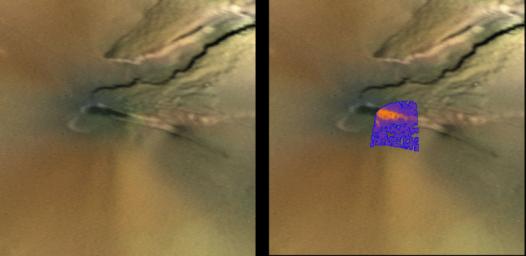
|
Temperature Map of Pele, Io
- Click the image above for a larger view
- Full-Res JPEG (1130 x 550) (57.6 kB)
- Full-Res TIFF (1130 x 550) (1.4 MB)
Caption:
Pele, one of Io's best-known volcanoes, was observed by the infrared spectrometer, an instrument onboard NASA's Galileo spacecraft, during the flyby of Jupiter's moon Io on February 22, 2000. The temperature map is shown here on the left in false color, superimposed on a visible color image of the Pele region obtained by the Voyager spacecraft in 1979. The red color represents the hottest lava flows. The purple colors are cooler materials. Preliminary results show that the temperatures of the hottest lava flows are at least 1,400 Kelvin (about 2,000 Fahrenheit), consistent with the temperatures of basaltic lava seen on the Kilauea volcano in Hawaii. It is possible that the eruption temperatures at Pele are even higher, as lava cools quickly once it starts to spread over the surface. The Voyager context image is 200 kilometers (124 miles) across.
Background Info:
The Jet Propulsion Laboratory, Pasadena, Calif., manages the mission for NASA's Office of Space Science, Washington, D.C. JPL is a division of the California Institute of Technology in Pasadena.
This image and other images and data received from Galileo are posted on the World Wide Web, on the Galileo mission home page at http://solarsystem.nasa.gov/galileo/ . Background information and educational context for the images can be found at http://solarsystem.nasa.gov/galileo/gallery/index.cfm .
Cataloging Keywords:
| Name | Value | Additional Values |
|---|---|---|
| Target | Io | |
| System | Jupiter | |
| Target Type | Satellite | |
| Mission | Galileo | Voyager |
| Instrument Host | Galileo Orbiter | |
| Host Type | Orbiter | Flyby Spacecraft |
| Instrument | Near-Infrared Mapping Spectrometer (NIMS) | |
| Detector | ||
| Extra Keywords | Color, Infrared, Map, Volcano | |
| Acquisition Date | ||
| Release Date | 2000-05-31 | |
| Date in Caption | 2000-02-22 | |
| Image Credit | NASA/JPL | |
| Source | photojournal.jpl.nasa.gov/catalog/PIA02560 | |
| Identifier | PIA02560 | |
